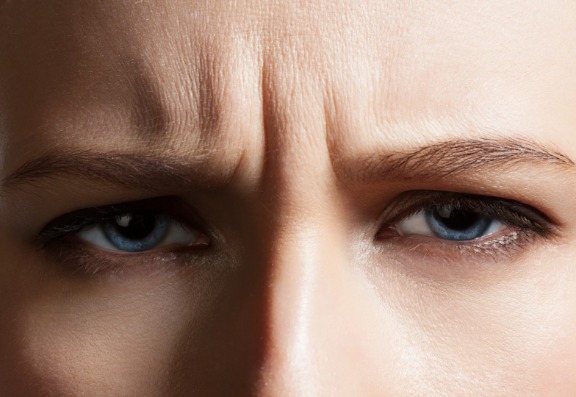For many of us, the cycle of life is not entirely plain sailing. Whilst we celebrate the highs and hopefully lock them into our happy memories, the lows can blow.
At times the lows can overtake daily life and make us feel like a thief has stolen the stars above. In the wake of recent current events many of us may find ourselves personally saddened and reflective as the UK mourns its loss, whilst simultaneously celebrating the long life and reign of Queen Elizabeth II.
How to turn your frown upside down
Depression; it’s probable that at some time in your life you will experience degrees of this.
Sometimes manageable and other times, for some, so gargantuan that it can be all consuming.
In this month’s blog I take a look at the recent research on botulin toxin (Botox) and show how it demonstrates how it can have a similar effect to an anti depressant. Yes, you read correctly – Botox!

How can Botox help with depression
Let’s explore a little further to truly understand the correlation…
When we are upset, sad, tired, frustrated and angry our facial expressions can act as a mirror of our feelings. For many, a poker face isn’t sustainable 24/7, and although we may put on a brave face for others it’s impossible to escape those facial expressions behind closed doors.
Did you know that when you smile it activates tiny molecules in your brain that are designed to help fight stress? These marvellous molecules are called neuropeptides and they facilitate neurons in your brain, and that also, when you do allow yourself to crack a smile your brain releases dopamine, endorphins and serotonin. What more reason do we need to smile? We feel so much better, and our positivity shines through our faces to others… spreading happiness.
These chemicals reduce anxieties and increase all happy hormones. Genuine smiles can not only change your day, but it can make a significant difference to someone else’s. Our facial expressions do so much of our talking without us even saying a word. Bringing light and positivity through an authentic smile can brighten even the darkest of days. Humour is medicinal, alongside the warmth of love whichever form that takes.
So now you have an understanding of the chemical relationship between our expressions and the way our brains function, just imagine the messages that are transmitted to the brain when we feel down, sad and depressed. The impact of how we express our feelings at any time is dramatically reflected in the mind, and because of their close relationship, when we frown it sends those vibes to the brain.
This phenomenon is called ‘facial feedback’. Both Charles Darwin and William James conducted studies that explore the correlation between facial movements and their impact on the brain, and when you stop and consider that it can be an ‘ah ha’ moment, along with a ‘Why didn’t I think about that’?

How can Botox help with depression
Facial expressions such as fear, sadness, or anger can result in a contraction of muscles in the forehead that causes those glabeller frown lines.
In someone that is depressed, and who may be using these muscles more often, it will cause them to work and crease at a faster rate. Botox blocks these frowning muscles for 12 weeks, and studies have shown that a patient can have up to 24 weeks of reduced depression when Botox is injected.
Can Botox help depression
It’s important to mention that these are relatively early studies and more research needs to be done, and by no means would we suggest that Botox can offer you the same level of relief from depression as prescribed antidepressants, we are simply demonstrating that the discovery and correlation of freezing a facial muscle with a reduction in sad feelings is associated with facial feedback.
And of course, if your lines are concerning you, and Botox could provide a boost for you, then this really couldn’t be simpler. Feeling good in yourself, less of the frowning and more of the positive glow will make you feel more optimistic. Remember that with Botox it is always advisable to keep a level of movement in the area to be treated so that you can express yourself but that natural, authentic expressions eased by an injection from a fully qualified aesthetics professional is recommended.
So, this is most certainly food for thought. If you are feeling a little sad and down, making your frown lines a little more pronounced, just remember that whilst aesthetic treatments don’t offer a cure, they can offer a boost to your self-esteem. In turn, this will then boost your mood. For those that feel that life is relentless and can’t see their sunshine, we would urge you to speak it out to someone, just as a first step, this could be family, a friend or colleague, or a medical professional, there’s no need to feel alone and often, admitting these things to ourselves is the greatest step we can take.
I hope that now you’ve read all about facial feedback you’re turning that frown upside down and are smiling… because you now know how good it is for you!

Author: Dr Raquel Amado
DR RAQUEL SKIN AND MEDICAL COSMETICS WAS FOUNDED BY DR RAQUEL AMADO
Dr Raquel was born in Portugal, where she graduated as a dental surgeon in 2007.
She undertook training for six years, studying human physiology, pathology, biology and specifically the head and neck.
Soon after, Dr Raquel moved to England, working for the NHS as a General Dentist.
Over the years, she did a post-graduate in Dental Sedation and Pain Management at the UCL Eastman Dental Institute in London, a year certificate of Cosmetic and Aesthetic Restorative Dentistry, as well as other accreditations.
It was at this point Dr Raquel developed a real passion for medical aesthetics. She completed several training courses on facial aesthetics with such prestigious institutions as Derma Medical, Face and Harley Academy, before founding her own aesthetics clinic in Kings Hill.
At Harley Academy, Dr Raquel also found a home as a Lead Senior Clinical Mentor for the UK’s largest postgraduate training provider in aesthetic medicine, guiding other medical professionals through the UK’s first fully-regulated Level 7 qualification for injectables.
She is an Affiliated Member of the Aesthetics Complication Expert Group (ACE) of practitioners and CMAC, which aims to improve patient safety in facial aesthetics.
As Dr Raquel has been clinically trained to use anaesthetics safely, she is highly skilled with needles and injection techniques.
Throughout her career, Dr Raquel has understood that most people are looking for a reliable, honest relationship with their practitioner, which is why she takes the time to understand how her patients feel.
Dr Raquel is known for her friendly and caring manner, being discreet, and putting her patients at ease. She is committed to the provision of safe, high-quality patient care in order to achieve the best outcomes for patients, and make them feel confident in their own skin.
To view more blogs by Dr Raquel Amado please click here.
